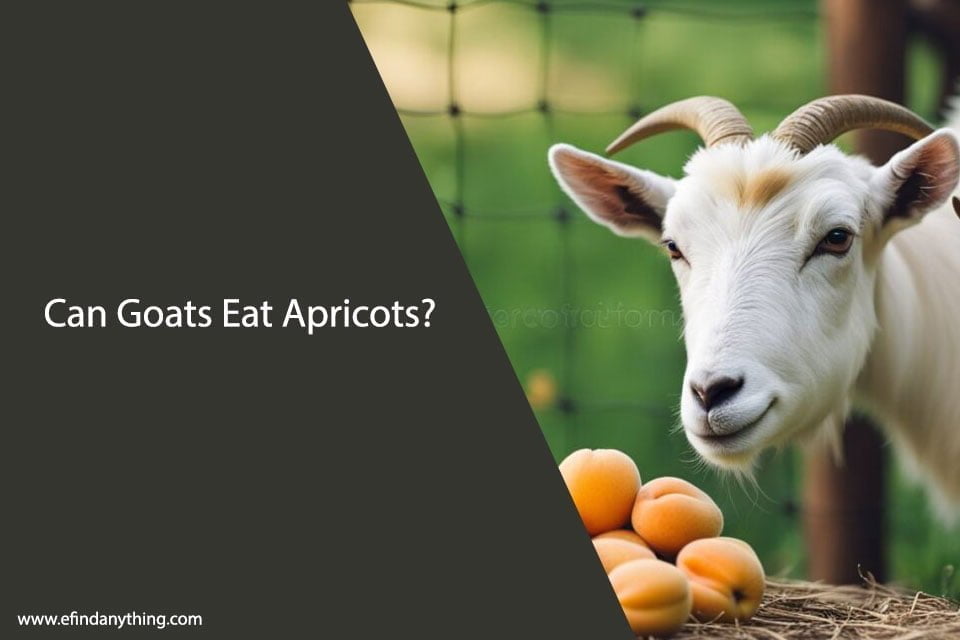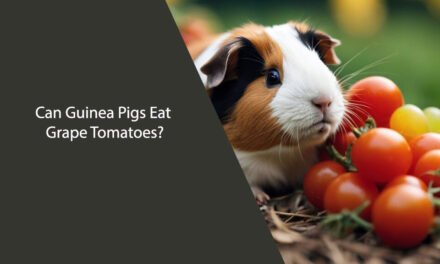Goats are known for their curious and adventurous nature. As herbivores, they enjoy munching on a variety of plants and fruits. However, not all foods are safe for goats to consume. One question that often arises is whether goats can eat apricots.
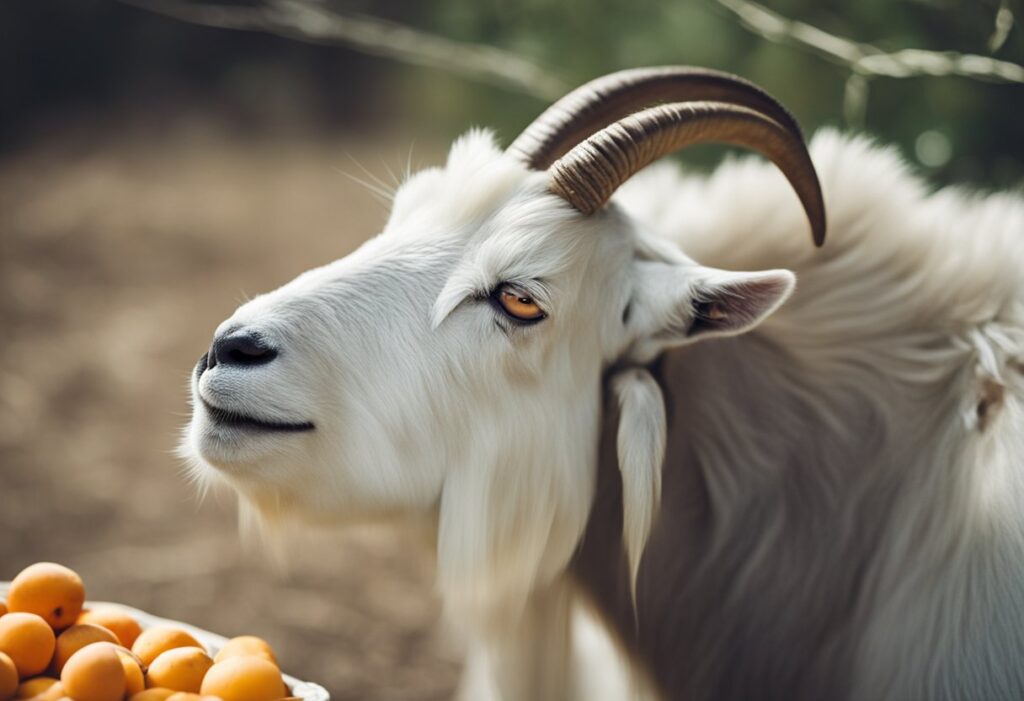
Apricots are a popular fruit that are enjoyed by many people. They are a good source of vitamins and minerals, such as vitamin A and potassium. However, when it comes to feeding apricots to goats, there are some important considerations to keep in mind. In this article, we will explore whether goats can safely eat apricots, what the potential risks are, and how to feed them to your goats in a way that is healthy and safe.
Table of Contents
Understanding Goats’ Dietary Needs

Goats are known for their voracious appetites and their ability to eat almost anything. However, just because goats can eat something doesn’t necessarily mean that it’s good for them. As responsible goat owners, it’s important for us to understand our goats’ dietary needs to ensure that they stay healthy and happy.
Goats are ruminants, which means that they have a four-chambered stomach designed to break down tough plant materials. They are also browsers, which means that they prefer to eat leaves, twigs, and woody plants rather than grasses. In the wild, goats would eat a variety of plants, including shrubs, trees, and herbs.
When it comes to feeding our goats, it’s important to provide them with a balanced diet that meets their nutritional needs. This includes:
- Roughage: Goats need roughage to keep their digestive system healthy. This can come from hay, pasture, or browse.
- Protein: Goats need protein for growth, milk production, and overall health. Good sources of protein include alfalfa, soybean meal, and dried distillers grains.
- Vitamins and minerals: Goats need a variety of vitamins and minerals to stay healthy. These can be provided through a commercial goat feed or through supplements.
It’s important to note that goats have different nutritional needs depending on their age, sex, and stage of production. For example, a pregnant or lactating doe will have higher nutritional needs than a wether or a dry doe.
In addition to providing a balanced diet, it’s also important to ensure that goats have access to clean water at all times. Water is essential for digestion and overall health.
By understanding our goats’ dietary needs and providing them with a balanced diet, we can help ensure that they stay healthy and happy for years to come.
Can Goats Eat Apricots?
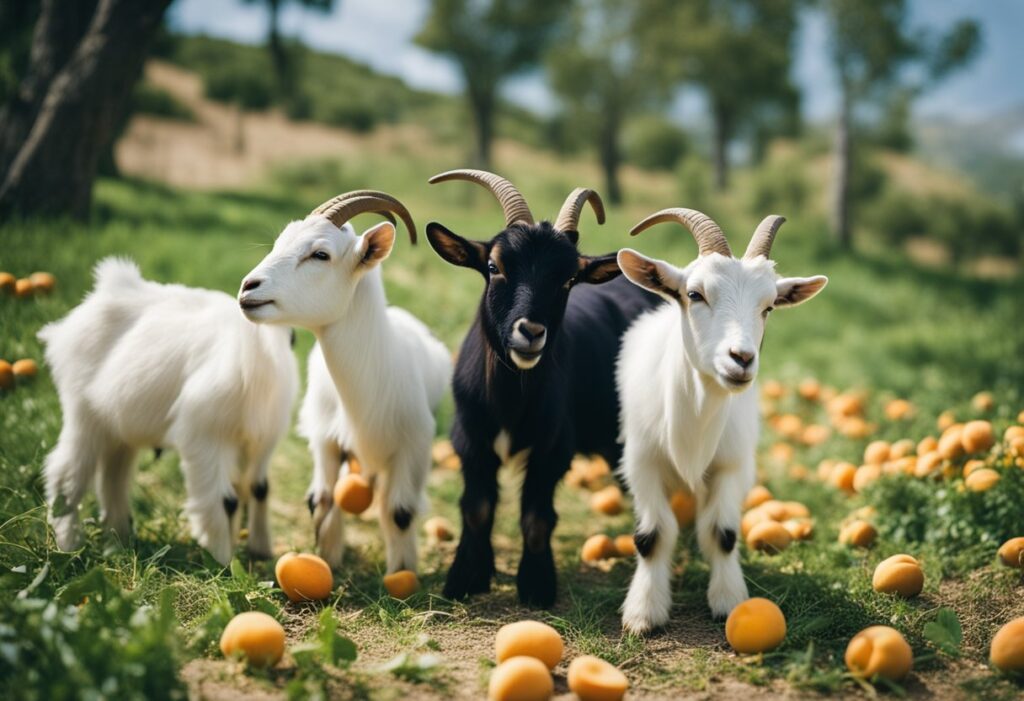
Goats are known for their love of munching on anything they can get their mouths on. However, not all foods are safe for them to consume. As such, it’s important to ask whether goats can eat apricots.
The answer is yes, goats can eat apricots, but only in moderation. Apricots are a good source of fiber, vitamins A and C, and potassium, which are all essential nutrients for goats. However, they also contain a high amount of sugar, which can cause digestive problems for goats if they eat too many.
It’s important to note that the pit of the apricot should never be fed to goats. The pit contains cyanide, which is toxic to goats and can cause serious health problems or even death.
If you decide to feed your goats apricots, make sure to do so in moderation and remove the pit before giving it to them. As with any new food, it’s important to introduce apricots slowly and monitor your goats for any signs of digestive issues.
In conclusion, while apricots can be a healthy addition to your goat’s diet, it’s important to feed them in moderation and remove the pit before giving it to them. As always, consult with your veterinarian before making any major changes to your goat’s diet.
Benefits of Apricots for Goats
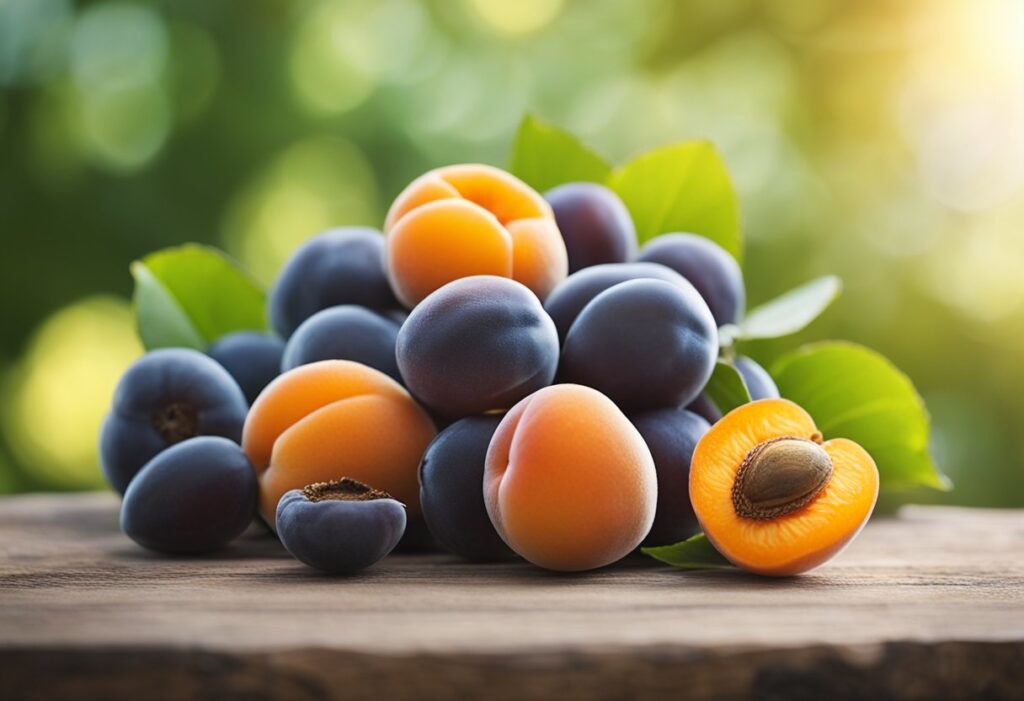
Goats can enjoy the sweet and juicy taste of apricots as a healthy snack. Here are some benefits of apricots for goats:
Rich in Nutrients
Apricots are a good source of vitamins and minerals that are essential for goats’ health. They contain high levels of vitamin A, which is important for maintaining healthy skin, eyes, and immune system. Apricots also have vitamin C, which boosts the immune system and helps with iron absorption.
In addition, apricots are rich in potassium, which helps to regulate blood pressure and maintain healthy heart function. They also contain fiber, which aids in digestion and prevents constipation.
Hydration Source
Apricots are a great source of hydration for goats, especially during hot summer months. They are mostly made up of water, which helps to keep goats hydrated and prevent dehydration.
Feeding apricots to goats can also help to prevent urinary tract infections and kidney stones, as they help to flush out toxins and promote healthy urine flow.
Overall, apricots can be a healthy and tasty addition to a goat’s diet. However, it’s important to feed them in moderation and ensure they are ripe and free of any mold or pesticides.
Potential Risks of Apricots for Goats

Goats enjoy eating a variety of fruits, including apricots. However, it’s important to be aware of the potential risks associated with feeding apricots to goats.
Apricot Seeds
One potential risk of feeding apricots to goats is the ingestion of apricot seeds. Apricot seeds contain a compound called amygdalin, which can break down into cyanide when ingested. While the amount of cyanide in a single apricot seed is unlikely to cause harm to a goat, consuming a large number of seeds can be dangerous.
To avoid this risk, it’s important to remove the seeds from apricots before feeding them to goats. Additionally, it’s best to limit the amount of apricots fed to goats to prevent overconsumption.
Overfeeding Apricots
Feeding too many apricots to goats can also lead to digestive issues. Apricots are high in sugar and can cause bloating and diarrhea if consumed in excess. Goats should be fed apricots in moderation, as part of a balanced diet that includes hay, grains, and other types of forage.
It’s also important to note that apricots should not be fed to goats as a sole source of nutrition. Goats require a variety of nutrients to maintain their health, and a diet consisting solely of apricots would not provide the necessary nutrients.
Overall, while goats can safely consume apricots in moderation, it’s important to be aware of the potential risks associated with feeding them to goats. By removing the seeds and limiting the amount of apricots fed, goats can enjoy this tasty treat without any negative consequences.
How to Feed Apricots to Goats

When it comes to feeding apricots to goats, it is important to keep in mind that moderation is key. While apricots are safe for goats to eat, they should be given in limited quantities, as too much can cause digestive issues.
To start, it is best to introduce apricots gradually into your goat’s diet. Begin with small amounts and observe how your goats react. If they show signs of discomfort or digestive issues, it may be best to avoid feeding them apricots altogether.
When feeding apricots to goats, it is important to remove the pit first, as it can be a choking hazard. You can either cut the apricot in half and remove the pit, or mash it up and remove the pit that way.
It is also important to note that apricots are high in sugar and should be given as a treat rather than a staple in their diet. Too much sugar can lead to obesity and other health issues in goats.
Overall, feeding apricots to goats can be a healthy and enjoyable treat for them, as long as it is done in moderation and with caution.
Alternatives to Apricots for Goats
When it comes to feeding goats, there are many fruits and vegetables that can be given to them as treats or as part of their regular diet. If you’re looking for alternatives to apricots, here are some options:
- Apples: Goats love apples, and they’re a great source of fiber and vitamins. Just make sure to remove the seeds and core before giving them to your goats.
- Bananas: Bananas are another fruit that goats enjoy. They’re high in potassium and other nutrients, and can be given as a treat or mixed into their feed.
- Carrots: Carrots are a good source of beta-carotene and other vitamins, and goats enjoy them as a snack. You can chop them up and mix them in with their hay or feed.
- Watermelon: Goats love watermelon, and it’s a great way to keep them hydrated on hot days. Just make sure to remove the rind and seeds before giving it to them.
- Pumpkin: Pumpkin is high in fiber and other nutrients, and goats enjoy eating it. You can give them raw pumpkin or cook it and mix it in with their feed.
Remember to always introduce new foods slowly and in small quantities to avoid digestive upset. And be sure to avoid feeding your goats anything that is toxic to them, such as chocolate, avocado, or rhubarb.
Frequently Asked Questions
Are apricots safe for goats to eat?
Yes, apricots are safe for goats to eat in moderation. However, it is important to remove the pit before feeding them to goats as the pit contains cyanide which is toxic to goats.
Which fruits are safe for goats to consume?
Goats can safely consume a variety of fruits including apples, bananas, blueberries, grapes, mangoes, and watermelon. It is important to feed them in moderation and remove any pits or seeds before feeding.
What are some human foods that goats can safely eat?
Goats can safely eat a variety of human foods including bread, carrots, celery, and cooked rice. However, it is important to avoid feeding them processed or sugary foods as they can cause health problems.
Can goats eat fruit pulp?
Yes, goats can eat fruit pulp. However, it is important to remove any seeds or pits before feeding them to goats.
What fruits should be avoided when feeding goats?
Goats should avoid fruits that are high in sugar such as cherries and figs. Additionally, fruits with pits or seeds such as peaches and plums should have the pits removed before feeding.
What is a comprehensive list of foods that goats can eat?
In addition to fruits and human foods, goats can also eat a variety of vegetables such as broccoli, cabbage, and spinach. They can also consume hay, grass, and grains such as corn and oats. However, it is important to introduce new foods slowly and in small quantities to avoid digestive issues.

